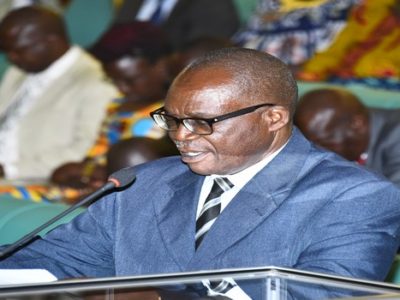In January 2020, Ham Enterprises dragged Diamond Trust Bank (DTB) Uganda and Kenya to Court for fraudulently debiting over Shs120b from their Shillings and Dollar accounts. The Bank’s failure to refund the unlawfully debited monies from the company’s accounts made Ham Enterprises to institute legal action against the Bank for recovery of the money.
Diamond Trust Bank responded by alleging demand of Ugx. 39Billion and asking the court to Impose regulation 13 that was just smuggled into the mortgage act onto Ham Enterprises. This was after a court order was granted in favour of Ham, nullifying and Halting Diamond Trust Bank’s Audit as it is repugnant to Article 28 of the Ugandan Constitution which provides a right for every Ugandan to fair hearing. According to court documents, Kiggundu provided security/mortgage comprised in Plot no.923, Block 9 located at Makerere Hill Road to support the credit facilities he had got from DTB but the businessman says when he carried out an audit and reconciliation of the loan accounts, he found out that the DTB had taken shs34 billion and $23 million from his account.
The High Court therefore has ordered Diamond Trust Bank (DTB) Uganda and Kenya to pay Shs120b they had illegally debited from Ham Enterprises accounts and Shs9.6b as legal fees and damages they caused to the Enterprise.
Justice Henry Peter Adonyo ruled that DTB Kenya illegally carried out business in Uganda by lending to Hamis Kiggundu without obtaining a licence from Bank of Uganda as required by law.
“I would find that mortgage credit transaction was carried out illegally and that fact becomes a clear question of law and not fact,” Adonyo said.
Although in DTB’s defence, they say that their Kenya counterparts (DTB Kenya) had appointed DTB Uganda which is licensed to carry out business in Uganda to act as their agent and thus they operated legally to collect funds for repayment of the said credit facility from Ham Enterprises, the judge overruled the same explaining that such action of appointing DTB Uganda to act as an agent of DTB Kenya ought to have been done legally and the former gets license from the Central Bank to do the job that the judge said that such actions, in his view, were by their very nature the carrying out of financial institution business which are regulated under section 4 (1) of the Financial Institutions Act 2 of 2004 and for such actions requires valid licenses granted for that purpose by the Central Bank of Uganda.
In response, the Uganda Bankers Association didn’t support the judgement and vowed to join hands with DTB to appeal claiming that the impact of such a judgement is negative to Uganda’s economy. The association has called upon Bank Of Uganda (BOU) to come out and pronounce itself upon this matter and the BOU has done so.
To the business man Hamis Kigundu, such a victory is a stepping stone in Uganda’s economy that has acted as an eye opener to many business men and women who are being cheated by Banks of which many are foreign banks that just repatriate profits as well as dodge paying withholding taxes on loan interests.
Although there have been many cases of this nature in Uganda including Fredrick J.K Zaabwe Vs. Orient Bank Ltd and 5 others, Simba (K) Ltd and 4 others Vs. Uganda Broadcasting Corporation, Sam Kuteesa and others Vs. Attorney General and others, for this case of Ham Kiggundu and others Vs. Diamond Trust Bank, there has been growing rate of mixed reactions of other bankers, Uganda bankers’ association, bank of Uganda, the legislature and may other stakeholders on the implication of the ruling on Uganda’s economy as the decision has attracted the concerns of the whole banking industry, development partners and the government.
In my view, the ruling has positive implications towards Uganda’s economic and fiscal liberation which include;
- Reducing the rate of tax evasion. The act by foreign banks to use locally operating subsidiaries in execution of financial transactions in Uganda is basically aimed at avoiding and evading taxes. A lot of revenue is being lost under such settings which include, income taxes on interest earned, stamp duties on mortgage deeds as well as licensing taxes. Such monies are saved and taken back to foreign economies where the mother bank is operating from thus making a loss to Uganda.
- Saving and protecting Ugandans against being cheated by banks. It should be noted that Ham Kigundu and others filed HCCS No. 43 of 2020 against Diamond Trust Bank (U) Ltd and Diamond Trust Bank (K) Ltd, seeking the recovery of monies unjustly and illegally obtained from the 1stApplicants bank accounts and for various breaches of contractual, fiduciary and statutory duties. Such a move which resulted into a court ruling in favor of Ham is a stepping stone to the rest of Ugandan businessmen to carryout audits of their accounts and establish whether these companies of which many are foreign are not cheating them. The most annoying factor is that they do not only cheat Ugandans but also repatriate the monies they have cheated.
- Boosting respect for the existing financial legal regime in Uganda. All financial institutions across the globe are aware that the financial sector is the most regulated in all countries and these regulations are taken seriously. In Uganda, section 126 (3) of the financial institutions Act, 2 of 2004 as amended provides that: A financial institution which does any act prohibited by this Act or fails to do anything required by this Act commits an offense and where no specific penalty is provided, the financial institution is liable on conviction to a fine not exceeding two hundred and fifty currency points.
Although the moralists would argue that Ham, having received the money, is meant to pay back, let’s look at the fraudulent acts of the bank too which are also illegal.
- Saving the economy from the economic risks associated with money laundering. The ruling has opened the eyes of the regulating body in Uganda to enforce the regulations governing registration and licensing of financial institutions operating in Uganda which is fundamental in reducing then illicit flow of funds into and out of the economy.
- Empowering local banks. Many foreign banks which open up subsidiaries in other countries have been found of undercapitalizing the local banks to make them keep relying on the parent bank whenever large sums of money are needed rather than getting proper licensing from the regulating authorities. This make them come up with schemes of purporting the advancement of loans by the parent bank and then the locally existing one acts as a mere agent whose work is to collect the money and transmits it to the foreign country where the mother bank is. This ruling therefore acts as an eye opener to Uganda such that foreign banks fully empower their locally operating subsidiaries within Uganda to contribute to the national economy through reduction of money laundering and tax evasion.
Therefore, although many stakeholders have argued that the court ruling has serious negative implications for our economy such as capital fleeing the country, rise in lending rates as well as reduction in lending by foreign financial institutions, there is no country that doesn’t prioritize the regulation of the financial industry. Given the fact that Uganda is an independent country with set legal regimes, these frameworks need to be respected by foreign institutions and adhered to as a way of protecting our people, our economy and financial autonomy just the way advanced economies did in a more mercantile setting that supported their economic development up to the level of encouraging economic liberalization that supports them not us.
Dixon Kagurusi Ampumuza is the C.E.O of theugandan.com and Former NRM MP Aspirant Kinkizi West.
+256772194116
dampumuza@gmail.com












